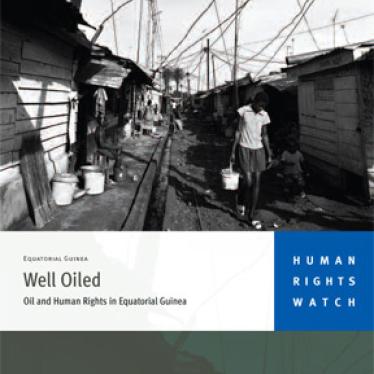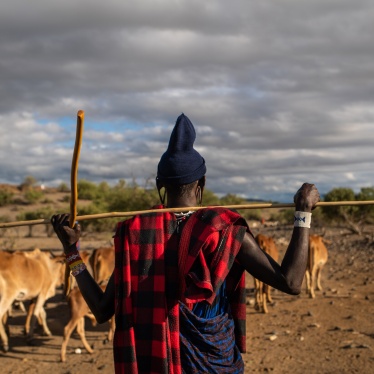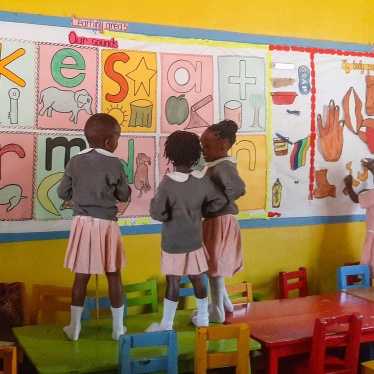(New York) - Conditions in Equatorial Guinea cast serious doubt about the credibility of the forthcoming presidential election, Human Rights Watch said today.
President Teodoro Obiang Nguema Mbasogo, who has ruled the oil-rich West African country since seizing power in a coup in 1979, is widely expected to easily win the presidential vote scheduled for November 29, 2009.
"President Obiang claims that he's committed to the rule of law," said Arvind Ganesan, director of the Business and Human Rights Program at Human Rights Watch. "But his actions time and again are those of a dictator determined to hang onto power and control of the country's oil money."
The government of Equatorial Guinea is one of the most corrupt and abusive in the world. In recent weeks it has stifled and harassed the country's beleaguered political opposition, denied the opposition equal access to the media, imposed serious constraints on international observers, and failed to set out clear terms to allow journalists to monitor the elections.
The government and ruling party officials are responsible for massive corruption, as documented in "Well Oiled: Oil and Human Rights in Equatorial Guinea," a July 2009 report by Human Rights Watch being released today with a full Spanish translation.
President Obiang has declared that Equatorial Guinea is "an authentic democracy," but in reality, the ruling Democratic Party (Partido Democrático de Guinea Ecuatorial, PDGE) maintains a monopoly over political life. Only two of the four other political parties with candidates running in the upcoming presidential election - the Convergence for Social Democracy (Convergencia para la Democracia Social, CPDS) and the People's Union (Unión Popular, UP) - actively oppose the ruling party and Obiang.
The compromised nature of the elections was further underscored when, on November 22, Obiang told supporters that he would win re-election "with more than 97 percent of the vote." Previous elections followed a similar pattern: Obiang won the last presidential election, in 2002, with 97.1 percent of the vote; and his party won overwhelming victories in 2004 and 2008, taking 98 and 99 seats, respectively, out of 100 in the legislature.
Those elections were marred by serious irregularities. The 2008 campaign was considered freer than earlier ones. But there was a strong presence by military and security personnel on the streets of all major towns, limits on freedom of movement, harassment of opposition supporters and voters, restrictions on access by international journalists, and numerous irregularities at polling places.
"The elections this month come at a crucial moment for a country whose wealth is being squandered by the president, his family, and their associates," Ganesan said. "This was an important opportunity for sorely needed public accountability, but the government has ensured that the basic requirements for free and fair elections won't be met."
The country's rampant corruption drains funds that could be used for education and health care. Development indicators are among the lowest in sub-Saharan Africa even though Equatorial Guinea is the richest country in the region on a GDP-per-capita basis.
President Obiang's eldest son and possible successor, known by his nickname Teodorin, has financed a lavish lifestyle through the proceeds of corruption. His total spending on mansions, exotic cars, and other luxury goods in 2004-2007 was nearly double the government's 2005 budget for education. In 2007, the United States government undertook an investigation of his US purchases - including a $35 million mansion, a $36 million jet, and luxury cars worth at least $2.6 million - on suspicion that they were financed with funds derived "from extortion, theft of public funds or other corrupt conduct."
President Obiang announced on October 16 that the election would be on November 29, with campaigning to begin officially on November 5. The tight timetable and the government's refusal to make the voter rolls public have severely limited the opposition's ability to campaign and win support.
Voter registration was completed in October, but the electoral lists still had not been made public as of mid-November. The opposition voiced suspicion that this move was intended to keep opposition supporters off the rolls. The government claimed that it could not release the names because opposition supporters might use the information to harass other parties.
The opposition is hampered by skewed coverage in the government-controlled media that heavily favors the ruling party and by the virtual absence of a free press. Similarly, although the government has provided financing for all parties, the ruling party had far greater access to state funds and other resources than did the opposition.
Opposition parties also complained of harassment and intimidation as they carried out campaign activities in various parts of the country. Although Human Rights Watch was not in a position to confirm directly their allegations of attacks and other abuses during campaigning in October and November, the Obiang government and ruling party have a long history of cracking down on opposition activities in election years, often citing "security reasons" in the wake of real or perceived coup attempts.
Following an armed attack on the presidential palace in February 2009 that it later blamed on a Nigerian rebel group, the government rounded up, arbitrarily arrested without warrant, and held without charge 10 People's Union members, at least two of whom were tortured. Eight were later released, but two remain in Equatorial Guinea's notorious Black Beach prison.
No independent and impartial body exists in Equatorial Guinea to oversee the electoral process or consider election-related complaints, raising additional serious doubts about conditions for a genuinely free and fair vote. The National Election Commission is controlled by the ruling party and headed by Obiang's minister of the interior, a prominent member of his party.
The conditions imposed by the government of Equatorial Guinea on international election observers do not permit them to carry out independent foreign monitoring. The terms and scope of the foreign observation missions were made public in an October presidential order. It interferes with the independence and freedom of movement of foreign election monitors in several ways:
- Observers will be permitted to travel to witness the vote only "in accordance with the program established for that purpose by the government" (articles 11, 12, and 18).
- They are to report any "problems" or "anomalies" directly to the government (arts. 20 and 22).
- Their ability to speak to the "official news media" about their "activities" during voting is subject to approval by the Interior Ministry (art. 21).
- They may issue their findings publicly after the voting has concluded, but the content of their statements must be coordinated with the National Electoral Commission, which is controlled by the ruling party (arts. 24 and 25).
- They are prohibited from "interfering" in any "political matters" or making "controversial statements" about the election authorities or "disparaging" remarks about the government, the political parties, or candidates (arts. 4, 22, and 23).
These conditions are inconsistent with the Declaration of Principles of International Election Observation and Code of Conduct for International Election Observers, as endorsed by intergovernmental and nongovernmental organizations conducting election observation, including the African Union.
It also remains unclear how many foreign journalists will be permitted access to Equatorial Guinea on or around election day. In the past, some foreign journalists have been unable to obtain visas. In July, President Obiang told Spanish journalists that his government had refused visas to major Spanish media outlets during the 2008 election because it was upset over critical reports in the Spanish press.
There are indications that visas might be restricted again this year. In mid-November, while speaking at an oil and gas conference in London, the vice minister of mines, industry and energy announced that the government was instituting a new visa regime "to defend Equatorial Guinea" from "people without good intentions."







